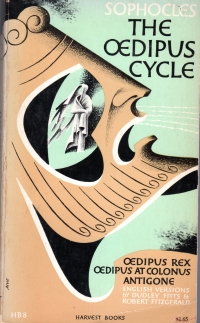 This book collects the three Greek plays in the Oedipus trilogy from 2500 years ago.
This book collects the three Greek plays in the Oedipus trilogy from 2500 years ago.
Oedipus Rex, the first chronologically, is set over the course of a couple of days when the king of Thebes (Oedipus) is told by the oracles that a plague will continue until the murderer of the former king Laius is found and handled. Oedipus says the man will be killed. However, during the course of investigating and interviewing people on the stage, he comes to learn that even though he fled his home town because he was prophesied to kill his father and bed his mother, he was adopted in that town because his real father, Laius, had his son put to death because the son was prophesied to kill him–and kindly shepherds instead of leaving him to die in the countryside let him be adopted in a distant town. So all that was prophesied comes to pass, and when Oedipus learns the truth, he blinds himself and becomes a wandering beggar. Two and a half millennia later, we know the story (at least for a couple years yet, by which time all classical education will be educated out of our culture), but I tried to read with a double-effect reader, learning only the truth as it was exposed on stage. It was pretty suspenseful, so I pretended.
Oedipus at Colonus takes place just outside Athens. Oedipus, the blind wanderer, is accompanied by his daughter Antigone into the grove sacred to the Furies. There, his brother-in-law comes to retrieve him to have him nearby Thebes in case they need him. His son comes to recruit him in a civil war against his brother who sits on the throne of Thebes. Everyone wants to use Oedipus for their own ends without valuing the man, so he ends up cursing everyone except Theseus, the ruler of Athens, and Antigone and prophesies a deadly war in Thebes. Then he dies.
Antigone, which I read in high school, tells of the after-effects of the said civil war. Both of her brothers are dead. One, the ruler of Thebes, is buried with hero’s pomp. The other is left for the dogs outside the city walls. Creon, Oedipus’s brother-in-law, now rules Thebes and proclaims death for anyone who buries the rebelling brother. Antigone, because God’s laws overrule men’s laws, buries him anyway. Creon holds to his word and prepares to put her in a cabin where she’ll starve to death (because then it’s not him killing her, see?). A series of people cross the stage to try to get him to relent, including his son who was to marry Antigone, and Teiresias, the seer, but he remains firm until the end, where he relents. However, when he refused to relent, people cursed him, and by the time he has relented, the fruits of the curses have already occurred. As he gets to the cabin to release Antigone, he finds she has hanged herself and his son kills himself. When Creon returns with the news, his wife kills herself. And Creon must live with the fruits of his arrogance.
There’s a certain parallel between the first and the third plays; Oedipus is a hard-headed and hot-headed ruler who proclaims his father’s murderer must be killed, which leads to his downfall, although his sins of incest and patricide were done in ignorance. Creon evolves over the plays from a trusted advisor to a hothead and arrogant ruler.
I’ll be honest, I feel worst about Creon in Antigone; he finally relents and does the right thing–allowing the burial of his nephew and goes to release Antigone, but he bears the punishment for his wrongs even as he tries to amend them. That, brothers and sisters, is real tragedy.
The translation work by Fitts and Fitzgerald is very good; they’ve taken some liberties, as they explain in their afterwards to Oedipus in Colonus and Antigone but it probably makes for a better read.
It also makes me want to read Aeschylus’ Seven Against Thebes, which is part of that playwright’s version of the trilogy and fits between the events of Oedipus in Colonus and Antigone.
Maybe I’ll find that in an upcoming book sale. As I’m reading millennia-old classical literature, of course I’m going to buy up a bunch of it that I won’t read for a long time.
Books mentioned in this review:














